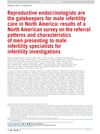 5 citations,
May 2019 in “Hormone and Metabolic Research”
5 citations,
May 2019 in “Hormone and Metabolic Research” Women with nonclassic 21-hydroxylase deficiency can have successful pregnancies through IVF, with certain factors affecting their chances.
 August 2013 in “Fertility and Sterility”
August 2013 in “Fertility and Sterility” High levels of fatty acids are linked to increased androgen production and inflammation in women with PCOS, which may affect IVF outcomes.
The right balance of Myo-Inositol to D-Chiro-Inositol in follicular fluid is crucial for good egg and embryo quality.
 2 citations,
November 2018 in “International journal of gynaecology and obstetrics”
2 citations,
November 2018 in “International journal of gynaecology and obstetrics” Women with different PCOS types have similar fertility treatment results.
 27 citations,
March 2018 in “Fertility and Sterility”
27 citations,
March 2018 in “Fertility and Sterility” Women with PCOS who had antiandrogenic treatment before pregnancy had fewer complications than those without treatment.
 55 citations,
May 2019 in “Journal of Endocrinology”
55 citations,
May 2019 in “Journal of Endocrinology” Androgens are important for female fertility and could help in IVF treatment, but also play a role in causing PCOS.
 26 citations,
July 2019 in “Fertility and Sterility”
26 citations,
July 2019 in “Fertility and Sterility” Reproductive gynecologists are the main referrers for male infertility evaluations in North America.
 24 citations,
July 2019 in “Journal of Obstetrics and Gynaecology”
24 citations,
July 2019 in “Journal of Obstetrics and Gynaecology” The combination therapy improved PCOS symptoms in both obese and non-obese women, with weight loss in the obese group.
 1265 citations,
October 2013 in “The Journal of Clinical Endocrinology and Metabolism”
1265 citations,
October 2013 in “The Journal of Clinical Endocrinology and Metabolism” The guideline suggests using specific criteria to diagnose PCOS, recommends various treatments for its symptoms, and advises screening for related health issues.
 36 citations,
May 2021 in “Nutrients”
36 citations,
May 2021 in “Nutrients” Natural molecules like inositols, resveratrol, vitamins, and omega-3 fatty acids may help manage Polycystic Ovary Syndrome (PCOS), but their effects vary and need more exploration.
 12 citations,
January 2004 in “Reproductive biomedicine online”
12 citations,
January 2004 in “Reproductive biomedicine online” Low-dose anti-androgen drugs and certain drug combinations are effective for hirsutism, and insulin sensitizers show promise, especially for those with polycystic ovarian syndrome.
 August 2024 in “The Journal of Urology”
August 2024 in “The Journal of Urology” The 2024 guideline updates recommendations for genetic testing, imaging, and sperm retrieval in male infertility.
 19 citations,
January 2019 in “Ginekologia Polska”
19 citations,
January 2019 in “Ginekologia Polska” The combined Myo-inositol and D-chiro-inositol treatment improved weight, hormone levels, and skin conditions in women with PCOS.
 April 2023 in “Bulletin of the National Research Centre”
April 2023 in “Bulletin of the National Research Centre” The document concludes that more research is needed to understand how PRP affects the ovaries and to standardize its use in treatment.
 1 citations,
August 2023 in “Bioengineering”
1 citations,
August 2023 in “Bioengineering” PRP may help with aging and osteoarthritis, improving tissue repair and reducing surgery risk.
 October 2010 in “Reproductive Biomedicine Online”
October 2010 in “Reproductive Biomedicine Online” A new method can almost perfectly distinguish adenomyosis from similar conditions using blood tests.
 195 citations,
November 2019 in “Clinica Chimica Acta”
195 citations,
November 2019 in “Clinica Chimica Acta” High levels of male hormones, insulin resistance, and obesity are closely linked and worsen polycystic ovary syndrome, but more research is needed to improve treatments.
 2 citations,
March 2020 in “bioRxiv (Cold Spring Harbor Laboratory)”
2 citations,
March 2020 in “bioRxiv (Cold Spring Harbor Laboratory)” HAIR may cause fetal loss by triggering different cell death processes in the uterus and placenta.
 December 2021 in “International Journal of Biomedicine”
December 2021 in “International Journal of Biomedicine” Hyperprolactinemia should be treated before confirming a PCOS diagnosis.
 68 citations,
January 2022 in “International Journal of Molecular Sciences”
68 citations,
January 2022 in “International Journal of Molecular Sciences” PCOS management includes lifestyle changes and medications, with ongoing research into repurposed drugs for better treatment options.
 1 citations,
January 2018 in “PubMed”
1 citations,
January 2018 in “PubMed” Women with PCOS have a similar chance of getting pregnant using assisted reproductive treatment as those without PCOS.
 88 citations,
May 2012 in “Human Reproduction Update”
88 citations,
May 2012 in “Human Reproduction Update” Women with PCOS may take longer to get pregnant but can have a normal family size, and should manage their overall health to reduce long-term health risks.
 9 citations,
March 2020 in “Gene”
9 citations,
March 2020 in “Gene” Certain gene variants in estrogen receptors are linked to polycystic ovary syndrome, mainly affecting metabolism, in Tunisian women.
September 2020 in “Fertility and sterility” Hyperandrogenism does not affect the quality of blastocysts in PCOS patients undergoing IVF.
 69 citations,
September 2006 in “Human Reproduction”
69 citations,
September 2006 in “Human Reproduction” Women with PCOS have fewer activated T cells in their ovarian follicles, which might affect fertility.
December 2019 in “Orvostudományi Értesítö” Lifestyle changes, medications, and fertility treatments can improve PCOS symptoms and prevent complications.
 19 citations,
October 2012 in “Frontiers of Hormone Research”
19 citations,
October 2012 in “Frontiers of Hormone Research” Lifestyle changes are the first step in treating infertility in PCOS, followed by medications like clomiphene and metformin, and then surgery if needed.

Accurate diagnosis and timely, tailored treatments improve outcomes in obstetrics and gynecology.
 88 citations,
April 2017 in “Journal of Pediatric and Adolescent Gynecology”
88 citations,
April 2017 in “Journal of Pediatric and Adolescent Gynecology” The document concludes that early diagnosis and treatment of Congenital Adrenal Hyperplasia are crucial for preventing serious health issues and improving patient outcomes.
 18 citations,
March 2014 in “Current Pharmaceutical Biotechnology”
18 citations,
March 2014 in “Current Pharmaceutical Biotechnology” Metformin helps regulate menstrual cycles, induce ovulation, and improve pregnancy outcomes in women with PCOS.


























